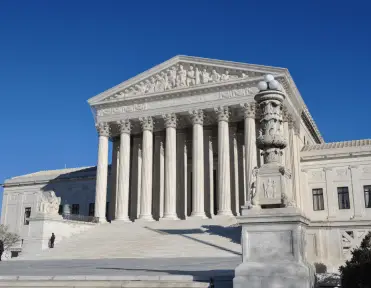 The United States Supreme Court made a decision yesterday that could weaken
The United States Supreme Court made a decision yesterday that could weaken
the protections that individuals have. Normally in a criminal defense
case, evidence found during an unlawful police search is inadmissible
during the trial proceedings. This is something that is protected under
the U.S. Constitution. The Supreme Court ruled that evidence found during
what would be considered an unlawful search can be used in a trial if
the officers involved found an outstanding arrest warrant along the way.
Justice Clarence Thomas — on behalf of the 5-3 majority in
Utah v. Strieff — said that the officer’s errors in judgement does not warrant
a violation of Strieff’s Fourth Amendment rights. The case began
with what was said to be an unlawful search, in which a narcotics detective
witnessed several people enter and leave a local home for short periods
of time after receiving an anonymous tip and conducting surveillance.
The detective assessed that the home was a location of drug activity based
on his own experience. It was reported that the detective did not note
when Strieff entered the home so he could not determine if the visit was
short enough to warrant suspicions. Still, the detective followed Strieff
to a local 7-11 where he was questioned about his visit. During this time,
the detective relayed Strieff’s personal information and it was
discovered that there was a traffic warrant out for Strieff. He was placed
under arrest and the detective searched him, finding methamphetamine and
charging him for unlawful possession.
Normally, this kind of evidence — that which is found during an unlawful
search — should be inadmissible in court. The Fourth Amendment’s
exclusionary rule believes that if law enforcement could benefit from
unlawful searches, there would be nothing to stop them from performing
them during each arrest.
Justice Sonia Sotomayor, along with Justice Ruth Bader Ginsburg, stated
the following:
The Court today holds that the discovery of a warrant for an unpaid parking
ticket will forgive a police officer’s violation of your Fourth
Amendment rights. Do not be soothed by the opinion’s technical language:
This case allows the police to stop you on the street, demand your identification,
and check it for outstanding traffic warrants — even if you are
doing nothing wrong.
Justice Sotomayor continued:
[The ruling] implies that you are not a citizen of a democracy but the
subject of a carceral state, just waiting to be cataloged.
This brings up an interesting topic as to what happens if someone is arrested
and convicted based on evidence discovered during an unlawful search.
This was a defense that is supposed to be protected by the Constitution
and provide defendants a way to assert their rights in court. If it becomes
something that others are overlooking and allowing the evidence to be
used in trial, it puts the defendant at risk of an unfavorable outcome.
It’s important to know where the courts stand on these issues and
make sure everybody’s Fourth Amendment rights are being protected.
At Koffel Brininger Nesbitt, our
Columbus criminal defense lawyers have handled numerous cases in which we have used unlawful searches and
inadmissible evidence as part of our defense. We are dedicated to making
sure our clients have a voice in court and that their rights are not violated.
In this type of case, you need serious representation from skilled legal
counsel. If you’ve been arrested after an unlawful search, we invite you to
contact our firm and learn more about your legal rights and options. We’re here to
defend you every step of the way.
Call or text 614-884-1100 or complete a Free Case Evaluation form

